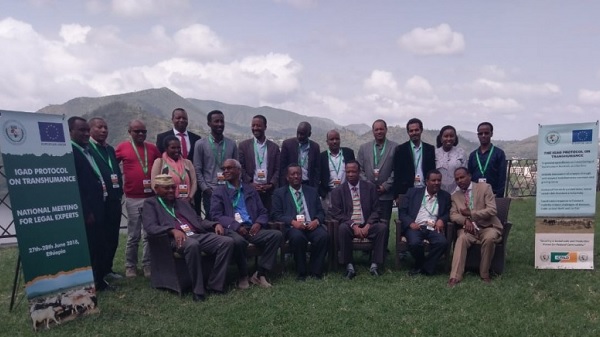
During the two-day meeting the policy and legal experts lauded Ethiopia for its support and interest in the Transhumance Protocol as an initiative to advocate and encourage the IGAD Member States to improve livestock productivity and production
BISHOFTU (IGAD)–The IGAD Centre for Pastoral Areas and Livestock Development (ICPALD) carried out a two-day national consultation meeting, in the last week of June 2018, for legal and policy experts from the Federal Government of Ethiopia.
The meeting held in Bishoftu, Ethiopia from the 27th and 28th June 2018 was to review the final technical draft of the Protocol on Transhumance in the IGAD region.
During the closing, Mr. Sewunet Chekol, the Director of the Ministry of Federal Affairs and Pastoral Development reiterated that enhancing cross-border cooperation on transhumance as an important landmark for Ethiopia considering that they host the largest population of livestock in the region as is for the IGAD region.
Other remarks in support of the Transhumance Protocol as a means to promoting pastoralism in the IGAD region were made by Dr. Adan Bika, on behalf of ICPALD Director and Dr. Thomas Cherenet, the policy advisor to the Minister of Agriculture, Livestock and Fisheries of Ethiopia.
During the two-day meeting the policy and legal experts lauded Ethiopian Government for its support and interest in the protocol as an initiative to advocate and encourage the IGAD Member States to improve livestock productivity and production in order to improve the livelihood of pastoralists/agro-pastoralists, infrastructure and social services in the arid and semi-arid areas.
The experts expressed their appreciation to IGAD for making efforts to provide a framework within which the pastoralists can move safely and easily across borders of other member states in search for water and pasture while minimizing the spread of transboundary animal disease.
The IGAD Transhumance Certificate (ITC) was also lauded as a timely initiative that will promote organized transboundary movement of livestock.
The experts also proposed specific strategies for the implementation of the protocol such as; formation of a National Steering Committee to implement the Protocol comprising of all key ministries; the steering committee can then establish a Technical Committee to carry out specific functions on implementation of the Protocol; establishment of transhumance offices in the cluster regions; formation / strengthening of peace building and conflict management committees; mapping of cross-border migratory corridors; establishment of animal health infrastructures; and establishment of Joint services and social amenities (mobile/nomadic schools, health centres).
The experts adopted all the provisions in the draft Transhumance Protocol by consensus after deliberations and clarifications were provided by the ICPALD Transhumance Expert, Mr. Japheth Kasimbu..
The draft will now await the final adoption and ratification through the Signing by the IGAD Council of Ministers and thereafter adoption by the IGAD Heads of State in a Summit at a later date.
Efforts to adopt and implement the IGAD Transhumance Protocol in the IGAD region is part of a three year program to facilitate free movement regime in the IGAD region. The program is being funded by the European Union Emergency Trust Fund (EUTF) to enhance orderly cross-border mobility and migration, regional economic integration and development.
Source: IGAD
